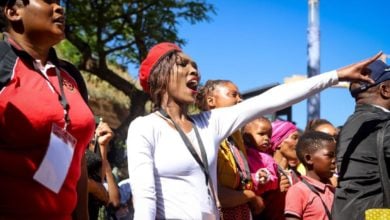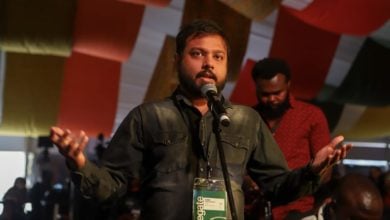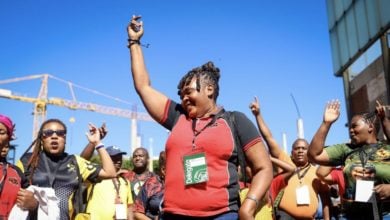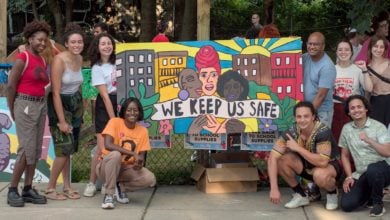On May 21, the Washington, D.C., branch
of the Party for Socialism and Liberation hosted the 2011 Socialism
Conference, heralding a “Stand Up Fight Back” movement.
Over 150 people attended the
conference, making it the largest conference in D.C. since the PSL’s
founding almost seven years ago. Attendees at the conference came
from across the East Coast and near South, including D.C., Maryland,
Virginia, Pennsylvania, New York and Connecticut.
Presentations and discussion at the
conference included topics such as the growing Arab revolution, the
significance of the labor upsurge in Wisconsin and the Midwest, the
current trends in Latin America, the fight against racism, sexism and
anti-LGBT bigotry, and the struggle to forge working-class unity.
In the opening panel, titled “From
Egypt to Wisconsin: Working People Fight Back,” Khaled Awad, a
member of the PSL in Baltimore who was able to speak to his family in
Egypt by phone during the revolution, explained: “These revolts in
the Arab world are not just a revolution for their own people; it’s
a revolution for the Arab people as a whole. A revolution to inject
the human spirit back into the dying souls of the working class from
Cairo to Gaza City, all the way back to the heart of global
capitalism here in the United States. … A spark was lit in Egypt,
and a social movement developed from protest, to resistance, to
revolution. And we in the PSL know it can and will happen here in the
United States, too. The people of the world want you to fight back
with them—they need you to fight back with them, because they need
revolutionary change here so their own struggle can advance.”
In the same panel, Bryan Castro, a
member of the PSL in New York City, told the crowd why he had become
active with the PSL: “I chose to stand up and fight back. I fight
for my sister’s future, and people like my mother who was forced to
seek a better future here in the United States. I fight for every
undocumented and documented worker in the United States because we
all sell our labor [power] for miserable wages compared to what the
capitalists make in profit off our labor. I fight because I know that
through socialism, these social-economic inequalities can be
eradicated.”
In addition to presentations by PSL
members, guest speakers included Mara Verheyden-Hilliard, an attorney
and the co-founder of the Partnership for Civil Justice Fund; Candi
Peterson, the vice president of the Washington Teachers Union;
Ardeshir Ommami, the president of the American Iranian Friendship
Committee; and Borys Ortega Rodriguez, the second secretary at the
Political and Economic Affairs office at the Embassy of the
Bolivarian Republic of Venezuela.
In the second panel, titled “The U.S.
Working Class Today,” Caneisha Mills, a member of the PSL in
Washington, D.C., and a member of AFSCME Local 2921, spoke about the
uprisings that have taken place this year from the Midwest to the
Arab world, and the role of a revolutionary organization:
“Spontaneous rebellion can only move us so far forward. These
actions have changed the debate. … [But] the systemic change that
is needed cannot occur through spontaneous rebellion alone. It
requires our organization into a new force. These actions are not
isolated. We cannot succeed if we fight as if Wisconsin, Maryland,
Tennessee, Ohio and the other states across the country are separate
struggles. The attacks on workers are part of imperialism, it is an
international attack on working people. So we must organize on a
national and international scale by linking the struggle of workers
here against cutbacks to those across the globe.”
In the same panel, Nick Powell, a
member of the PSL in Baltimore, discussed the struggle to forge
working-class unity: “Sisters and brothers, connecting these issues
and struggles is a critical task for our movement. If women are left
to fight alone for women’s rights, if the Black and Latino
communities are struggling on our own against police brutality, if
immigrant workers have to fight on their own against legislation that
criminalizes them, we will have a recipe for defeat. These divisions
can’t be overcome by simply raising Unity’ as an empty slogan; they
must be overcome in the course of struggle. The PSL is actively
involved in the struggles against racism and all forms of bigotry.”
The conference also included a wide
variety of musical performances, from hip hop artist Marcel Cartier;
a band trio of Matt Murray, Jalen Ngonda and Michelle Peterson; and
spoken-word performances by Esteban Olivares and Jinnette Caceres.
Following a third panel on “Global
Resistance to U.S. Imperialism,” the conference ended with a final
panel titled “We’re Fighting Back — Socialism is Possible!”
In it, Walter Smolarek, a high school student who is a member of the
PSL in Pittsburgh, concluded his talk by saying: “Ché Guevara said
that ‘the revolution is not an apple that falls when it is ripe.
You have to make it fall.’ This is the task of the Party for
Socialism and Liberation. Anyone who wants to be a dedicated fighter
for the working class and part of the movement to overthrow this
oppressive, crisis-ridden capitalist system should join our party.”
Following the conference, many people
asked to become members of the PSL.





